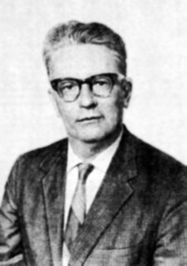Ivan L. Rudnytsky
Born
in Wien, Austria
October 27, 1919
Died
April 25, 1984
Genre

|
Історичні есе. Том І
by
—
published
1994
—
2 editions
|
|

|
Україна між сходом і заходом. Формування українського народу й нації
by
—
published
2012
|
|

|
Essays in Modern Ukrainian History
—
published
1987
—
2 editions
|
|

|
Історичні есе. Том ІІ
by |
|

|
Щоденники
by
—
published
2019
|
|

|
Нариси з історії нової України
by
—
published
1991
|
|

|
Rethinking Ukrainian History
by
—
published
1981
—
2 editions
|
|

|
Между историей и политикой
by
—
published
2007
—
2 editions
|
|

|
Istorychni Ese
|
|

|
THE ROLE OF THE UKRAINE IN MODERN HISTORY [3 PAPERS]
|
|
“Drahomanov believed that the logical consequence of democratic principles was socialism. For the moment we can leave aside the question of the exact content of Drahomanov's socialist program.
The basic tendencies must be made clear, however. True civic freedom requires not only that men have legal rights, but also that their social and economic conditions permit them to use them. The essence of the concept of democracy includes the idea of social change and social progress; otherwise it is no living democracy.”
― A Symposium and Selected Writings
The basic tendencies must be made clear, however. True civic freedom requires not only that men have legal rights, but also that their social and economic conditions permit them to use them. The essence of the concept of democracy includes the idea of social change and social progress; otherwise it is no living democracy.”
― A Symposium and Selected Writings
“It seems certain that Drahomanov analyzed correctly the practical possibilities open to the Ukrainian movement of his time. His analysis was validated by the fact that it was only after 1905-after the introduction of a certain, though very limited, degree of constitutionalism – that the momentum of the Ukrainian national movement increased. Drahomanov's attitude toward the question of independent statehood for the Ukraine was thoroughly compatible with his attitude toward the socialist maximal program. In both cases he was sceptical of utopias; he preferred to seek a strategic plan which would point the way forward from the status quo. But there was another element, besides this pragmatic one, which figured in his rejection of separatism. As we have seen, Drahomanov had a very individualist conception of freedom. His ideal was freedom from the State rather than freedom through the State. He considered concentration of power and power politics bad in themselves. But the foundation of a new State, even of a thoroughly democratic one, is impossible without power and power, politics, without the creation of authority and of a hierarchy. It is easy to understand that Drahomanov instinctively shrank from seeing the Ukrainian movement go in this direction. He hoped that the political freedom of the Ukrainian people could come from a gradual decentralist and federalist transformation of the existing power aggregates, Russia and Austria-Hungary. We should like to say here that, at a time when there was neither a Ukrainian State, nor even a modest practical basis for a Ukrainian separatist policy, a man like Drahomanov, whose nature it was to think in terms other than those of States, was particularly fitted to render service to the Ukrainian cause.”
― A Symposium and Selected Writings
― A Symposium and Selected Writings
“Drahomanov declared that each Ukrainian intellectual must settle himself in a specific community, and grow into a definite social milieu.
“[The intellectuals] must settle down in communities of our people, and use their forces to fulfill the needs of the social organism. This will enable them to spread sound ideas by word and deed... The whole Ukraine must be covered by a network of individuals and groups linked with each other.”
― A Symposium and Selected Writings
“[The intellectuals] must settle down in communities of our people, and use their forces to fulfill the needs of the social organism. This will enable them to spread sound ideas by word and deed... The whole Ukraine must be covered by a network of individuals and groups linked with each other.”
― A Symposium and Selected Writings










